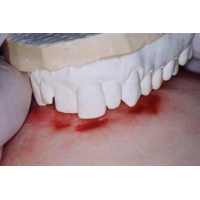Bite Mark Evidence at Trials May Bite the Dust

With DNA evidence now well established in court cases, the use of bite marks to prosecute attackers may be coming to an end.
Two dozen men convicted or charged with murder or rape based on bite marks found on their victims’ flesh have been freed over the past 13 years, giving opponents of the process reason to push for ending its use in trials.
The Associated Press reviewed numerous court cases and found 24 instances of defendants who went to jail because of bite marks, but ultimately were found not guilty as a result of DNA testing.
Many had spent years in prison, including on death row, according to the AP, with one man being incarcerated for more than 23 years. In separate cases, two men in Mississippi were convicted in the 1990s of raping and murdering three-year-old girls based on bite mark evidence. DNA testing later revealed that another man was guilty of both crimes and that the alleged bite marks were actually caused by crawfish or insects.
The news service also found that the Federal Bureau of Investigation no longer relies on bite mark analysis, and the American Dental Association does not recognize it.
“Bite mark evidence is the poster child of unreliable forensic science,” Chris Fabricant, director of strategic litigation at the Innocence Project, which helps wrongfully convicted inmates win freedom through DNA testing, told the AP.
Supporters of the method, which wasn’t used in a court case until 1974, claim it is still useful and has helped convict child murderers and other criminals, including serial killer Ted Bundy.
“The problem lies in the analyst or the bias,” Dr. Frank Wright, a forensic dentist in Cincinnati, told the AP. “So if the analyst is...not properly trained or introduces bias into their exam, sure, it’s going to be polluted, just like any other scientific investigation. It doesn’t mean bite mark evidence is bad.”
Certified forensic dentists, of which there are about 100 in the United States, receive between $1,500 and $5,000 per case.
-Noel Brinkerhoff
To Learn More:
Bites Derided as Unreliable in Court (by Amanda Lee Myers, Associated Press)
- Top Stories
- Unusual News
- Where is the Money Going?
- Controversies
- U.S. and the World
- Appointments and Resignations
- Latest News
- Trump Announces He Will Switch Support from Russia to Ukraine
- Americans are Unhappy with the Direction of the Country…What’s New?
- Can Biden Murder Trump and Get Away With it?
- Electoral Advice for the Democratic and Republican Parties
- U.S. Ambassador to Greece: Who is George Tsunis?






Comments